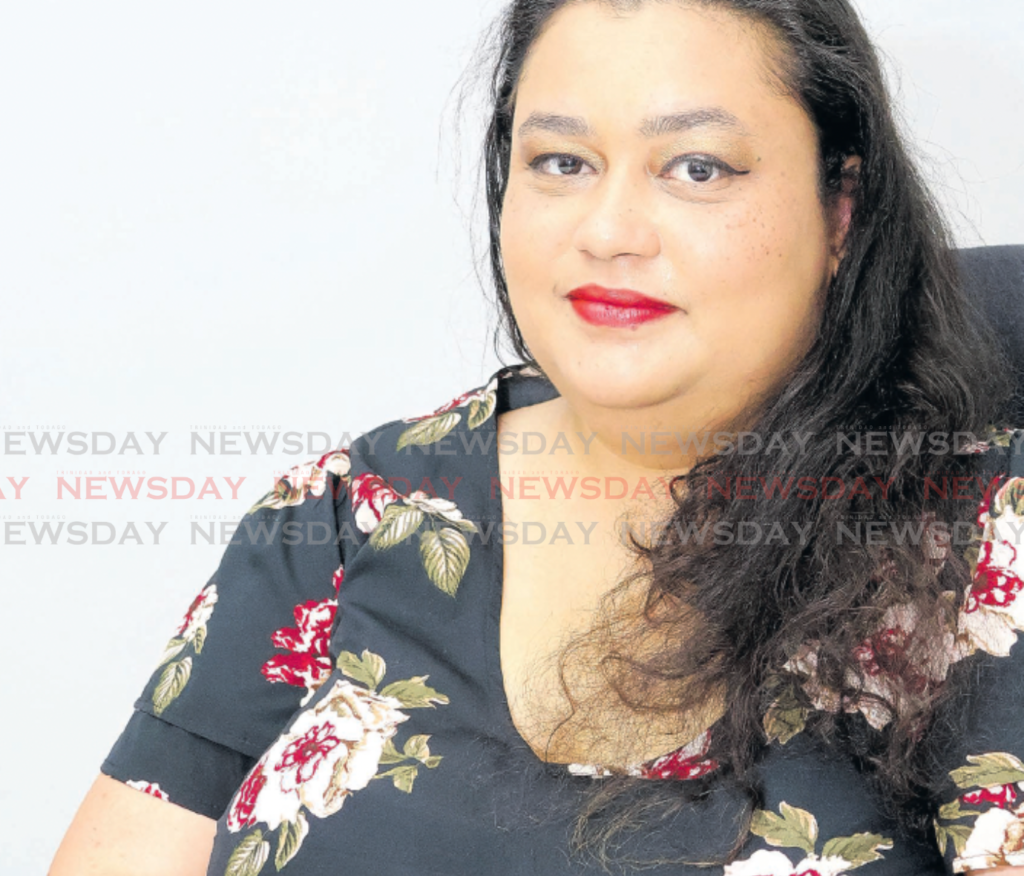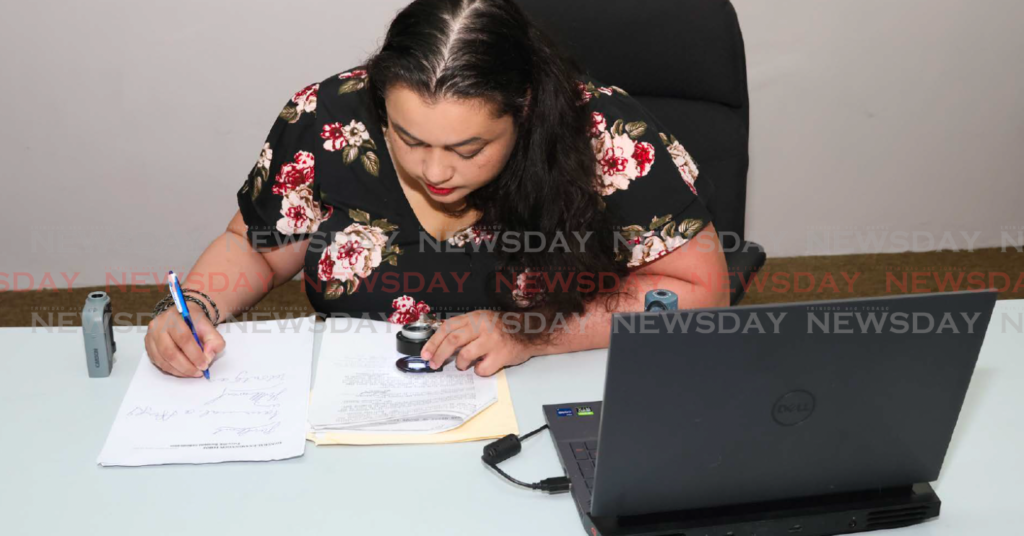Tracy Newling offers forensINK expertise

Forensic document examiner is a profession that requires patience and an eye for detail – two traits that Tracy Newling possesses and which led her to train in the field.
Newling is one of the few document examiners in TT, and wants to make the service more accessible to people. She said many people are not aware that these services were available locally.
Growing up in Woodbrook, Newling said she had always been interested in the sciences and became interested in forensics through what she called the CSI effect, where the surge in crime shows such as CSI: Miami, NCIS, Criminal Minds and others piqued her interest.
“I was trying to figure out what field I wanted to go into. I knew I didn’t want to go into medicine because I’m too squeamish for that. I considered doing radiography, X-rays and stuff like that, but when I started getting into forensics I realised there were so many different fields, and I saw I could get exposed to the different options and specialise later.”
After graduating from the Professional Institute of Marketing and Business Studies Ltd in Barataria, she went to Keele University in the UK in 2011.
“We were exposed to DNA analysis, toxicology, I even had an opportunity to do forensic anthropology, which is where you work with bones and skeletal remains, we did crime scene investigation, and a wide range of stuff.
“The document analysis part of it always fascinated me because of how different it was to the other disciplines. It’s very subjective, whereas in other areas the machine does the majority of the work and produces a result, so it’s more objective.”
She said at the time she was looking to do post-graduate studies, the government was offering scholarships in the area of forensic pathology and forensic document examination. She was able to access the latter, studying at the University of Central Lancashire, UK, in 2016.
Newling said unlike many other forensic professions which use machines and diagnostic tests, in her area the examiner is the one analysing the document.

“For example, with forensic chemistry and biology, you prepare a sample, you put it through a machine, and it prepares a graph or a spectra. In document analysis, we sit down, we watch the document, we might use microscopes and magnifying glasses to enhance what we’re seeing on the paper, and we’re drawing and making notes. So we are the machine.”
Her job entails using magnifying glasses to examine the inks used, the nuances in handwriting, and the inks used in printing to determine whether documents are authentic.
“If you’re looking at questionable signatures, you can use a filter to turn one red and one green. Because the combination turns black when you place them on top of each other, you know it was traced.
“We can’t say a signature is forged because we don’t know the intent, but we can say whether it’s genuine or non-genuine.”
Based on the terms of the scholarship, Newling returned to TT immediately after finishing her second degree.
“You have to work a certain number of years for the government based on the amount of the scholarship. There’s a programme called the Associate Professionals programme, where returning scholars are placed in a government office for one year in their field. So I worked in the Forensic Sciences Centre for a year, and trained under the document examiners there. I continued there under the OJT programme, and spent another two years training at the Forensic Sciences Centre.”
After leaving the centre, Tracy opened her own business, ForensINK Document Authentication, in 2021. She said she initially thought there would be a high demand for her services.
“It’s a bit tricky. There are very few document examiners I’m aware of in the country – fewer than ten of us and most of them have worked at the Forensic Sciences Centre at some point. I’m part of the International Association of Document Examiners, and we have continuing education classes weekly, and a lot of the time I’m hearing that one of the examiners based in America has to come to TT because they have a case here.”
She said she doesn’t think people are aware there are services closer to home rather than having to go to the US and the UK. She outlined the types of services that are usually requested.
“Most of the time there’s a disputed deed or wealth, and the originals would be lodged in the registry, and we would have to make an appointment at the registry to see them in person. Those are the majority of the cases, but you do sometimes get someone saying about a contract that the terms were changed and ‘I never signed this contract’ or ‘this is not my signature.’ I’ve also done wills, land, and probate disputes.”

She said when examining documents examiners looked at the whole document, even though the client is usually only interested in one issue, to see if there could be any more helpful information.
She said normally the examiner is asked by lawyers to examine documents. She said if a client uses a foreign document examiner, they would have to pay for their flight and accommodations to come to TT to do the analysis in person.
“We want to see original documents. A lot of the information we would want to analyse and come to a more solid conclusion could only be obtained if you look at the original document rather than a photocopy or scan. Although you can work with a photocopy in the interim, you want to work with the original documents, so they would have to fly over to Trinidad, then go back home until the court is ready for their testimony, which is an additional expense for the client.”
She said some courts are now doing virtual hearings, which can cut down costs for the client.
Newling said if she is hired for an international job, she would offer a free consultation to see if the samples they send online can be used and give them a conclusion that would be helpful to the case.
She said if the client wants to go forward, the documents could be scanned or sent to her through priority mail, but if they were stored in a government agency abroad, the client would have to fly her out and make an appointment for her to go to that office. Newling said she’s seen a change in the CSI effect, as people are now more interested in true crime, either reading about it or making content, rather than looking at science and the evidence.
“When I tell people I work in the area of forensics, they automatically assume it’s pathology, but there’s a lot more. Pathology is a branch of forensics, but there’s firearms analysis, fingerprint analysis, DNA, toxicology, chemistry, document analysis, toolmark comparison, all these different things. Forensic pathology is a separate thing, you have to do medicine for four years, and then pathology for another number of years.”
She said the way in which forensic science is portrayed on TV is not how it works in real life.
“It’s sped up for the sake of the episode. A lot of the time there’s a backlog on cases, and just because a case is brought in, it doesn’t mean it will be started today.
“The shows also show analysts doing multiple tests, like DNA in one scene and drug testing in another. These are two different fields and this doesn’t happen, because if you do forensic science, you do it in one particular area which is your speciality, unless you have multiple specialities and did multiple degrees.”
Newling said people often ask why they can’t do the document analysis themselves. She said in studies where document examiners and laypeople were given samples of handwriting and documents to find errors, the document examiners made fewer errors because they were trained to look for certain things.
In addition to working at her business, the 31-year-old Newling teaches mathematics and physics at Professional Institute of Marketing and Business Studies Ltd.
She’s also working on a novel in the science fiction genre, and enjoys reading science fiction and fantasy novels. She also sings and plays the guitar, as both of her parents are guitarists.
Newling said she hopes more people would become aware that there were several local document examiners in TT.
When she becomes a bit more experienced, she wants to train more document examiners.
“I think it’s an interesting field, but at the same time it takes a certain personality type to do this, because it’s basically you sitting down and looking at the documents under different magnifications and different lighting, so you have to have the patience to sit down and do it.”
For more information on the services offered by Newling, go to https://www.forensinkda.com/

Comments
"Tracy Newling offers forensINK expertise"